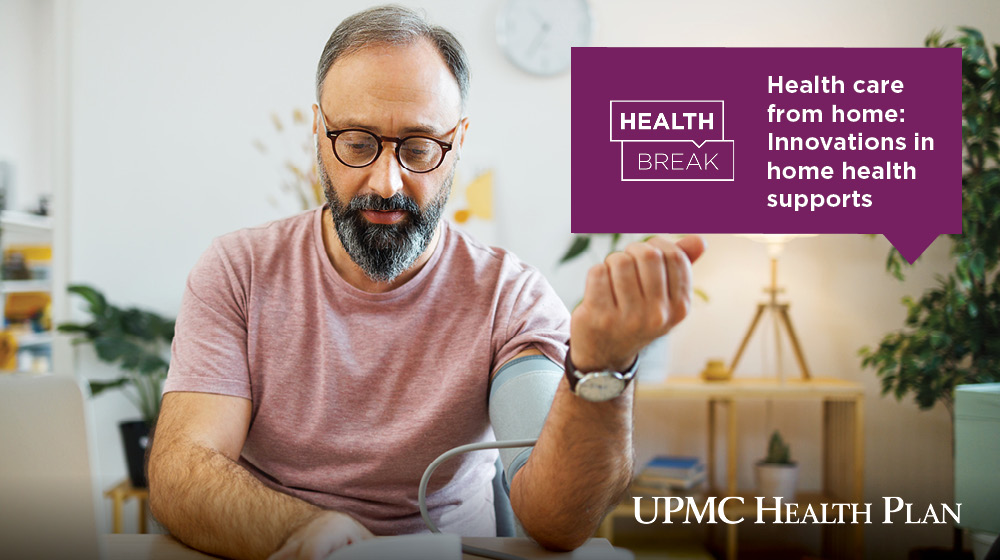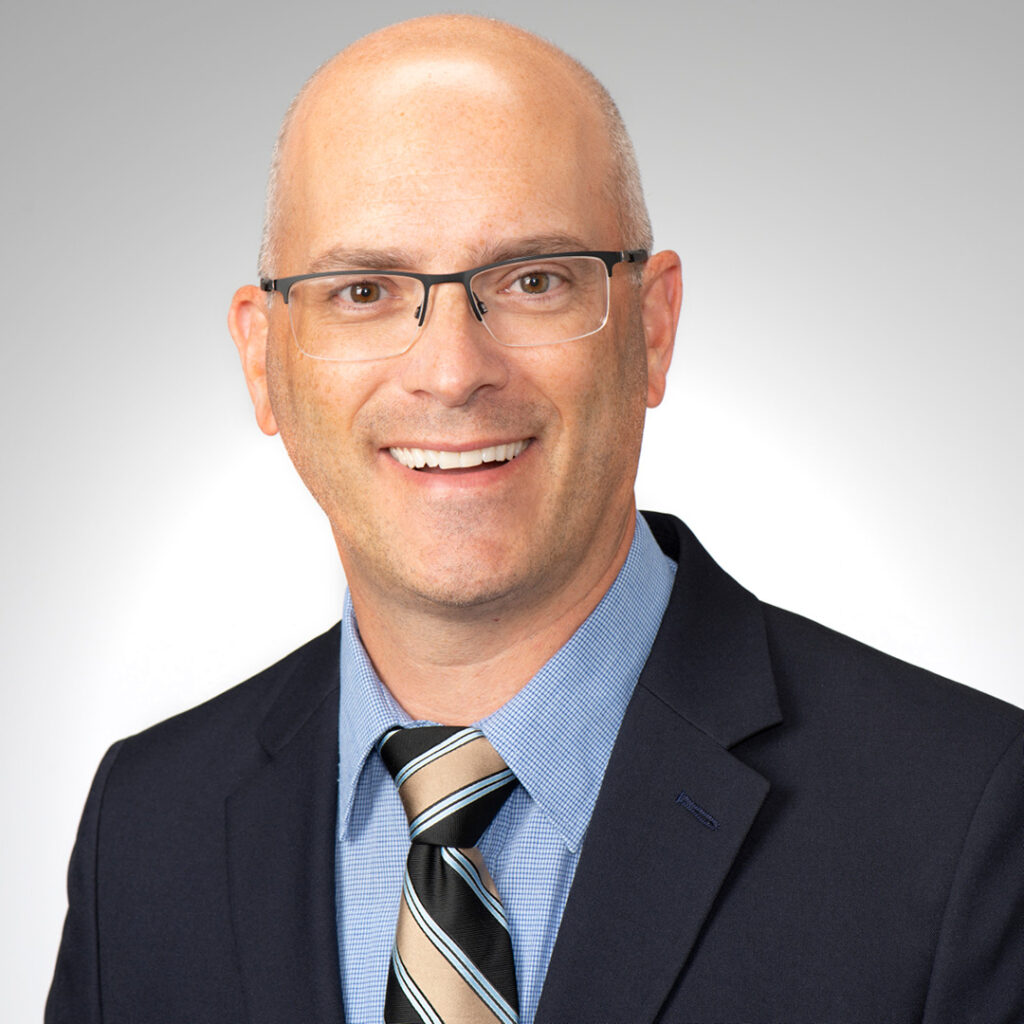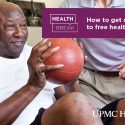Health Break: Health care from home: Innovations in home health supports

A podcast for UPMC Health Plan members, Health Break is your quick guide to caring for your mental and physical health, prioritizing wellness, and making the most of your health insurance plan.
Episode 34: Take a Health Break with Josh Rosman
In this episode, we’re taking a Health Break to discuss home health supports with Josh Rosman, certified registered nurse practitioner.
Episode transcript:
Camille: Welcome to Health Break by UPMC Health Plan, your quick guide to health, wellness, and how to make the most of your health insurance plan. I’m your host, Dr. Camille Clarke-Smith. I help to oversee the quality of the plans and programs we offer at UPMC Health Plan.
Angelo: And I’m your co-host, Angelo Bartic. I’m a health coach who works with our members on making healthy lifestyle habits and setting goals. This is your…Health Break.
Hey everyone, it’s Angelo Bartic. In this episode, we’re discussing home health supports with Josh Rosman. Josh, thank you so much for spending some time with us today.
Josh: Hey, thanks for having me.
Angelo: It’s our pleasure. What are some different types of home health care?
Josh: Traditional home health nursing typically consists of a weekly visit by a registered nurse following a hospital stay. Typically lasts somewhere between, you know, two to three weeks. In that process, patients can have rehab services available if necessary, such as physical therapy, occupational therapy, or speech therapy. Again, depending on their needs. Home health medical equipment may also be required, such as oxygen nebulizer treatments, adaptive devices such as walkers or canes. We also have the capability of in-home pharmacy where an IV medication may be required for several weeks following an infection that a home infusion company and a home health nurse coordinates that care for the patient to receive that treatment at home. These are just a few traditional ways members can be assisted with medical care within the comforts of their own home.
Angelo: Thank you so much. It sounds like there are some really great resources available. What are some new innovations in home health care?
Josh: UPMC Innovative Home Care Solutions provides several programs to help our members stay at home throughout Pennsylvania. One of our programs called Advanced Illness Care is a home-based supportive care program for patients with serious or advanced illnesses.
We have another program called In-Home Urgent Care Plus, which is available to members in the Allegheny County region, which connects them with a medic team and a physician who provides an assessment, a diagnosis, and a treatment to the patients in the comforts of their own home, typically for nonemergent events.
We also have a program called Connected Care, which is an application that uses remote monitoring through devices such as a laptop or smartphone or a tablet, keeping the member connected with their providers. Again, this program is involved for congestive heart failure patients, COPD, and patients recovering from COVID.
Angelo: You mentioned Advanced Illness Care. Can you tell us a little more about that?
Josh: I’d be happy to. So Advanced Illness Care, or AIC, is a home-based supportive care program for our health plan members with ongoing health issues. There’s no extra cost to our members–anyone with UPMC Health Plan and qualifying advanced conditions can utilize this program. The Health Plan recognizes how difficult it is for someone to have serious illness and the ongoing care and the ongoing needs that they experience. The program really was created to provide an extra layer of support to our members and helping them really live the best life they can as they face challenges with their own health. This program offers a nurse call line, which is available 24 hours seven days a week to assist with questions or concerns a member may have.
Each patient is assigned a health care team, which consists of a nurse practitioner, a registered nurse, and a social worker. They provide monthly visits for typically a longer standing period of anywhere from 6 to 12 months, again, dependent on the member’s needs. Visits can be done in a variety of ways. There are in-person home visits, virtual visits through a device such as a smartphone or a laptop, again if the Health Plan member is comfortable with technology, or they also can have a telephone support depending on where they are located within the state.
The Advanced Illness Care program offers really a team approach to our patients and their family. We help with management of ongoing symptoms. We assist with some difficult conversations regarding goals of care and their values. We also assist members with advanced care planning if they so desire. You know, [it’s] important to recognize what their future medical wishes would be if their condition worsens. We found that these conversations seem to go well in the comforts of their own home, where they have time to really think and discuss with their families. You know, in today’s world of specialized medicine, there’s a specialist for everything—heart specialist, a lung specialist, a cancer specialist. Members can get lost in the process. We’ve found that AIC providers really help our members navigate the challenges along the way as they deal with these serious conditions.
Angelo: It sounds like Advanced Illness Care really provides great benefit to UPMC Health Plan members.
Josh: It really does.
Angelo: How can UPMC Health Plan members learn more if they’re in need of home support for themselves or a loved one?
Josh: The member with a serious illness can certainly talk with their providers. Members across the state of Pennsylvania can take part in our AIC program. Members can also contact the Member Services phone number on the back of their card to be connected to a care manager who also can assist them with this process.
Advanced Illness Care really is a great program. It’s benefited thousands of health plan members. We really look forward to helping those in our community that are facing their ongoing health care needs in the years to come.
Angelo: Thank you so much, Josh for taking a Health Break with us today, discussing home health care and telling us more about the Advanced Illness Care Program through UPMC Innovative Home Care Solutions.
Josh: Thanks again for having me.
Angelo: Talk with your provider or contact Member Services if you think Advanced Illness Care would benefit you or a loved one.
Find show notes and more information at upmchealthplan.com/podcast. Join us as we continue exploring health, wellness, and how to make the most of your health insurance plan in the next episode of Health Break.
This podcast is for informational and educational purposes. It is not medical care or advice. Individuals in need of medical care should consult their personal care provider. Views and opinions expressed by the hosts and guests are solely their own and do not necessarily reflect those of UPMC Health Plan and its employees.
Related to this episode:
About Josh Rosman:
Joshua Rosman has been a nurse practitioner since 2001. He is board certified in both Family Medicine and Hospice/Palliative Care Medicine. He is currently the clinical director of Advanced Practice Providers for Innovative Homecare Solutions (IHS) at UPMC. Along with his director role, he provides clinical care for his patients that are enrolled in Advanced Illness Care (AIC) program. Josh earned his bachelor’s and master’s degrees in nursing from the University of Pittsburgh. He resides in Somerset, PA with his wife and three daughters.




